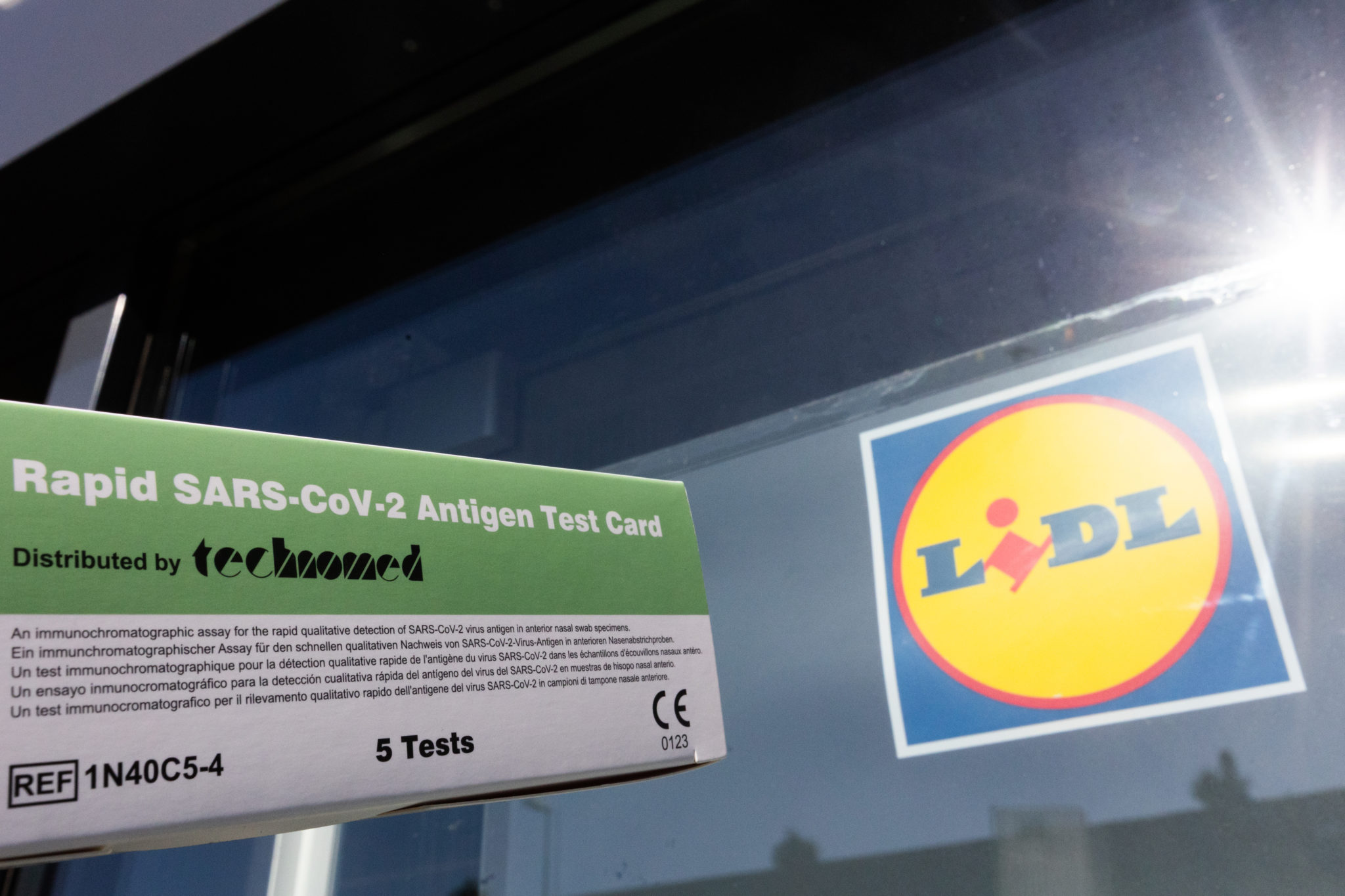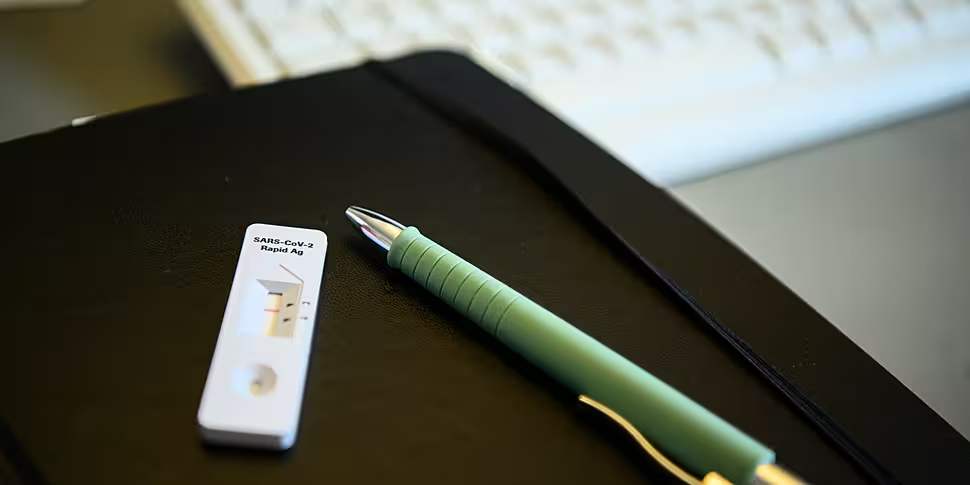The Government’s failure to trust people to use antigen tests correctly has blocked the use of a “very powerful tool” in the fight against COVID, according to a Harvard epidemiologist.
He was speaking after the Chief Medical Officer suggested antigen tests sold in supermarkets represented a ‘real risk’ to the pandemic response.
Meanwhile, the Chair of the NPHET modelling group Professor Philip Nolan compared tests sold at supermarket chain Lidl to ‘snake oil.’
Just last week, the Health Minister Stephen Donnelly told The Pat Kenny Show that people should “pretty much ignore” a negative result from the tests, insisting it “absolutely does not mean you are not infectious.”
On the show this morning, Michael Mina, Epidemiologist, Immunologist at the Harvard Public Health/Medical School said the comments were “not useful in any way, shape or form.”
“It is just not helpful,” he said. “We have to understand that, while this can get fired and charged up on Twitter, we are talking about people’s lives here and these are tools that, when used appropriately, can save lives by preventing spread.
“They can prevent spread in schools, in the workplace, in the community; so, to deride a tool that has the potential to save somebody’s life by preventing an outbreak is a net negative to public health.
“Those types of comments are not useful in any way, shape or form. We have to remember we are all on the same side here.
“The science is saying something different versus what folks like Nolan have inferred. I do believe we are all on the same side and it is sad to see it get so charged that they are calling a very powerful test, in the middle of pandemic, snake oil. It is just not appropriate.”
"This is propaganda, this is not fact." Pat challenges @DonnellyStephen on rapid antigen testing. @NewstalkFM pic.twitter.com/GjHU3n4fNC
— Pat Kenny Newstalk (@PatKennyNT) May 13, 2021
Dr Mina noted the Government’s ‘gold standard’ PCR test is an “immensely powerful and very sensitive tool” when it comes to detecting whether a patient has recently had the virus; however, it does not detect whether they remain infectious.
He said PCR tests currently return positive results for a period “about three times or four times longer than somebody is actually infectious.”
Rapid antigen tests are highly sensitive AND specific to be able to answer the question "Am I Infectious"
PCR is highly sensitive but NOT specific for this question. Pretending like it was led to millions of ppl being put in isolation and the wrong ppl quarantined
— Michael Mina (@michaelmina_lab) May 19, 2021
He noted that antigen tests on the other hand are “very powerful” when it comes to testing whether a patient is infectious.
“If I am going to visit my elderly grandparents in a nursing home, I am going to be much better off if I use a rapid test 20 minutes before walking in to that door than if I use a PCR test three days earlier,” he said. “They are not even close to comparable.
“If your question is, ‘am I infectious?’ a rapid test is an extremely powerful tool to ensure that, at that moment in time, you are not infectious.
“Whereas if you use a PCR three days earlier, you could literally be at your peak of viral load the moment you walk into that door even though the PCR test three days ago was negative.”
I’m sorry for Ireland. It’s about time that they invite someone who actually can explain to them why they are misinterpreting the Cochran review and all of the science behind rapid tests. We’ve written about it extensively. They are simply wrong on this.
— Michael Mina (@michaelmina_lab) May 13, 2021
In arguing against antigen tests, officials in Ireland have pointed to the findings of the Cochrane Report, which examined 64 studies and found the tests to be effective in identifying COVID in 72% of people who have symptoms.
That fell to 58% in people who have no symptoms.
Dr Mina said officials all over the world have been “making the wrong comparisons” between the two tests.
“It is really no more complex or complicated than exactly that,” he said. “People who are positive on an antigen test but are negative on a PCR are almost always passed the infectious phase.”
 A Boson Biotech Covid-19 antigen test pictured outside Lidl Drumcondra, 07-05-2021. Image: Sam Boal/RollingNews
A Boson Biotech Covid-19 antigen test pictured outside Lidl Drumcondra, 07-05-2021. Image: Sam Boal/RollingNewsHe said the ‘paternalistic’ attitude of public health doctors and failure to trust people to use the tests effectively has robbed us of an “extremely powerful” tool during a global pandemic.
“This is not new, unfortunately, to public health and physicians,” he said.
“When seat belts first came around in cars, the public health community at the time was saying we can’t put seat belts into cars because people will drive recklessly. Obviously, that is remarkably short-sighted today, we understand that.
“When pregnancy tests were starting to go into people’s homes and they were being held up from being over the counter, off the shelf, purchasable tests, the medical community was saying, we can’t give women pregnancy tests, they would never know how to interpret or use the test appropriately or really make sense of it.
“This paternalism in public health is nothing new but it is time we stopped that type of paternalism. Let’s not hold up important tools in the middle of a pandemic because we want control.
“People, it turns out, are the solution and they understand how to use simple tools. Sometimes we just have to explain it and the decision-makers are in a position to really help that process along.”
He said the US could have saved “hundreds of billions, if not trillions of dollars” if it had rolled out a national antigen programme last summer.
You can listen back here:









